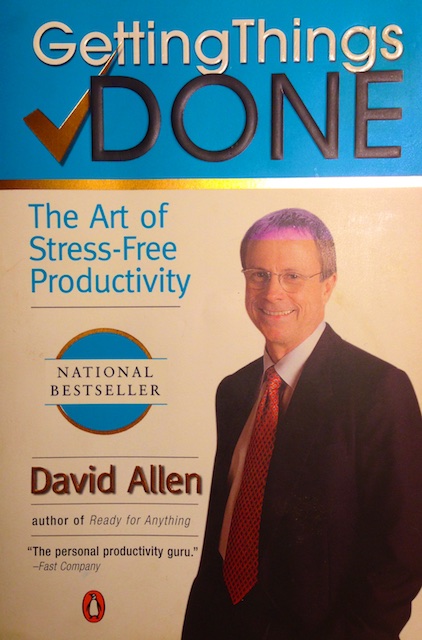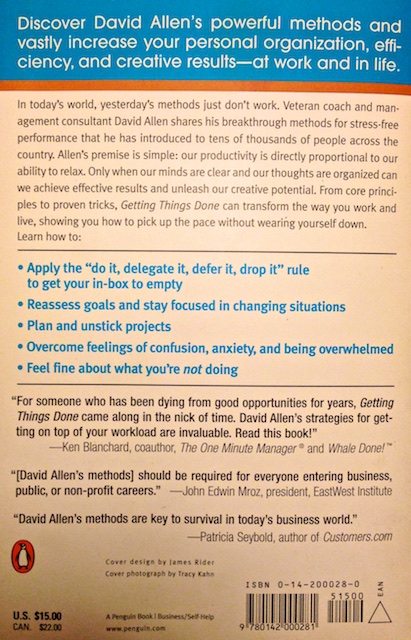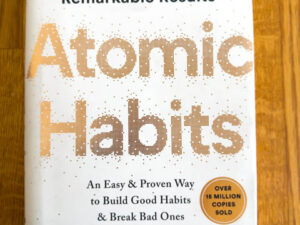
–
I had a dear friend who was a professional organizer and this book, Getting Things Done, was a favorite of hers. Written in 2001, it is not new, but given my goal this year is to “transform,” I thought reading it would be a good place to start.
This is a very detailed book, and I give it 5 stars. I recommend it if you are serious about getting your act together and want to wade through it. I find that the thinking here coordinates seamlessly with keeping a bullet journal, which I have been doing for about half a year. For those who would benefit from a summary of the book, I’ve included my notes below. The statements in quotation marks are verbatim, while those without quotation marks are me paraphrasing the text. I hope you find this helpful:
- “Your ability to generate power is directly proportional to your ability to relax… A tense muscle is a slow one. So the high levels of training in the martial arts teach and demand balance and relaxation as much as anything else. Clearing the mind and being flexible are key.”
- “Thinking in a concentrated manner to define desired outcomes is something few people do. But in truth, outcome thinking is one of the most effective means available for making wishes reality.”
- “Between the time you woke up today and now, did you think of anything you needed to do that you still haven’t done? Have you had that thought more than once? Why? It’s a waste of time and energy to keep thinking about something you make no progress on. And it only adds to your anxieties about what you should be doing and aren’t.”
- “Before you can achieve any of that, though, you’ll need to get in the habit of keeping nothing in your mind. And the way to do that, as we’ve seen, is not be managing time, managing information, or managing priorities. Instead, the key to managing all of your ‘stuff’ is managing your actions.”
- Every decision to act is an intuitive one. Move from hoping it is the right choice to trusting it is the right choice, which will immediately increase your speed and effectiveness.
- Try it right now: Choose one project that is new or stuck or that could simply use improvement. Think of your purpose. Think of what a successful outcome would look like. Consider potential steps. Organize your ideas. Decide on the next actions. Are you any clearer about where you want to go and how to get there?
- Some benefits of thinking about “Why?”: It defines success. It creates decision making criteria. It aligns resources. It motivates. It clarifies focus. It expands options. (People love to win, but if you are not totally clear about the purpose of what you are doing, you have no chance of winning.)
- “Simple, clear purpose and principles give rise to complex and intelligent behavior. Complex rules and regulations give rise to simple and stupid behavior.” Dee Hock
- We notice only what matches our internal belief systems and identified contexts. Understand how perceptive filters work: you won’t see how to do it until you see yourself doing it. You often need to make it up in your mind before you can make it happen in your life. Develop and create clear outcomes. Constantly define what you are trying to accomplish on many different levels.
- “Creating a list of what your real projects are and consistently managing your next action for each one will constitute 90% of what is generally thought of a project planning.” … but “If the project is still on your mind, there’s more planning to do.”
- “It is easier to act your way into a better way of feeling than to feel your way into a better way of action.” O.H. Mowrer
- “The highest performing people I know are those who have installed the best tricks in their lives. The smart part of us sets up things for us to do that the not-so-smart part responds to almost automatically, creating behavior that produces high performance results. We trick ourselves into doing what we ought to be doing.”
- Everything gets processed equally. Don’t avoid dealing with anything. Emergency scanning is not processing. Don’t leave anything unprocessed (in basket, email, etc.)
- Have good, consistent structure with which to manage the non actionable items in our work and lives. When non-actionable items are not properly managed, they clog up the whole process. Distinguish what is actionable and what is not. Then utilize a good filing system, digital or hard copy. Is it worth the time and space to keep it?
- Make someday/maybe lists or tickler files for non-actionable items that are not purely for reference. Add to that list things you might like to do someday if you have the time. Occasionally consult this list to see if you want to make any of these actionable. Put constant awareness back toward this list consistently.
- Making lists, as they occur to you, is one of the most powerful yet subtlest and simplest procedures you can install in your life. Possible checklists: personal affirmations, client lists, key life roles and responsibilities, things to ensure personal balance and progress, weekly to do lists, list of calls to make, grocery lists, everything to take on a trip, etc. Also organize lists based on where actions are done: at home, on the computer, calls, errands, for staff meeting or board meeting, and a list of things that need to be done that require very little physical or mental energy, etc.
- Review your system on a regular basis, keeping it current and functional. Do not let your lists fall far behind your reality. Establish at least a weekly review– a process of “whatever you need to do to get your head empty again.” Process loose papers and notes, list remaining action items, evaluate that status to projects and goals, delete things no longer relevant. Often early Friday afternoon is a good time for this.
- “Your best thoughts about work won’t happen while you are at work.”
- How do you decide what to do at any given point? Trust your intuition.
- “There is magic in being in the present in your life.”
- “The best place to succeed is where you are with what you have.”
- “Trying to manage from the top down, when the bottom is out of control, may be the least effective approach.”
- “If you are not totally sure what your job is, it will always feel overwhelming.”
- Have all your projects and next actions defined for each of your roles or responsibilities, keeping in mind your long term goals and objectives.
- “The middle of every successful project looks like a disaster.”” Rosabeth Moss Cantor
- “Let our advance worrying become advance thinking and planning.” Winston Churchill
- “The sense of anxiety and guilt doesn’t come from having too much to do; it’s the automatic result of breaking agreements with yourself.”
- “Out of the strain of the doing, into the peace of the done.” Julia Louis Woodruff
- “I have a personal mission to make ‘What’s the next action?’ part of the global thought process. I envision a world in which no meeting or discussion will end, no interaction cease, without a clear determination of whether or not some action is needed – and if it is, what it will be, or at least who has responsibility for it.”
- “When a culture adopts ‘What’s the next action?’ as a standard operating query, there is an automatic increase of energy, productivity, clarity, and focus.”
- Pick up every single piece of paper in your inbox and ask yourself what you need to do to move it forward.
- The secret of getting ahead is getting started. The secret of getting started is breaking your complex overwhelming tasks into small manageable tasks, and then starting on the first one.” Mark Twain
- “It is really the smartest people who have the highest number of undecided things in their lives and on their lists. Bright people have the capacity of freaking out faster and more dramatically than everyone else.”
- “You are either attracted or repelled by the things on your lists; there isn’t any neutral territory. You are either positively drawn toward completing the action or reluctant to think about what it is and resistant to getting involved in it. Often it is simply the next-action decision that makes the difference between the two extremes.” Have your lists be discrete next actions nothing more general! The “next action” question forces clarity, accountability, productivity, and empowerment.
- “When you start to make things happen, you really begin to believe that you can make things happen. And that makes things happen.”
- “A vision without a task is but a dream, a task without a vision is drudgery, a vision and a task is the hope of the world.” from a church in Sussex, England, 1730
- “Keep everything out of your head; decide actions and outcomes when things first emerge on your radar instead of later; and regularly review and update the complete inventory of open loops in your life and work. Get your workstation organized. Get in baskets. Create a personal filing system. Get a good list management organizer. Be patient and enjoy the process.”
- Visit www.davidco.com for tons of support material.
–

1 Comment
Pingbacks
-
[…] here) A book about travel A Thousand Days in Venice (light) A business book Getting Things Done (five star review here) A motivational book The Crossroads of Should and Must (light) An inspirational book Abundance: The […]






